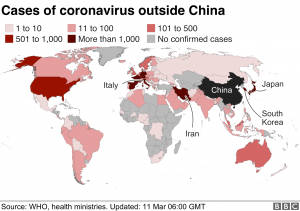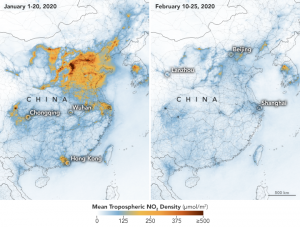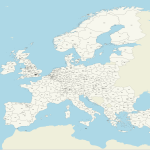What the unexpected COVID-19 virus outbreak teaches us about our environment
Written by Prof. Alberto Troccoli. Edited by Debbie Woodliffe.
The dramatic spread of the COVID-19 Coronavirus has led to several countries restricting the movement of people, including air travel. Previously, we’ve only seen government responses like this when concerned with more terrorist-related incidents – such as the tragic events of September 11 nearly twenty years ago when air traffic ground to a halt for several days. The fact that a virus is causing a larger, more extreme reaction is unheard of.
UPDATE: See also recent maps of total column Nitrogen Dioxide (NO2) and Carbon Monoxide (CO) in the blog post: Want to be informed about air pollution data during COVID-19 restrictions?
But this COVID-19 outbreak does present us with an interesting opportunity to uncover what happens to the air quality, and pollution in general, when human induced emissions are forcibly halted.
Removing the human element
These new striking images from NASA and the European Space Agency (ESA) show significant decreases in nitrogen dioxide (NO2) over China since the restrictions began. It’s pretty clear that this rapid drop in NO2 is mainly due to the remarkable reduction in human activity as a consequence of the coronavirus outbreak. Even more impressive changes are seen when you focus specifically on the epicentre of the COVID-19 outbreak in the Wuhan region.
Almost by coincidence, Italy has also been hit, particularly in Lombardy in the north which is one of the most polluted areas in Europe in terms of air quality. Now on total lockdown, this country has the largest number of COVID-19 cases in the whole of Europe.
But, similarly to China, the highly industrialized region of Lombardy in northern Italy has seen a drastic improvement in air quality since the lockdown began. While there may be meteorological factors at play here, it’s almost inevitable that this reduction is a direct consequence of the reduced traffic and economic activity.

Fig. 3 – Particulate (Pm10) concentration on 22 February 2020 (left, before outbreak in Italy) and 2 March 2020 (right). Red is for values between 50 and 100 µg/m³ and cyan for values from 0 to 20 µg/m³ (yellow are in between the red and cyan). Source: Arpa Lombardia.
What can we learn from the COVID-19 outbreak and the pollution reduction?
First and foremost, it seems evident that a drastic reduction in economic activity and traffic can lead to a sudden (within days as opposed to years) improvement in air quality. We’re not at all suggesting that this sort of economic pause is an exercise worth carrying out just for the sake of seeing a drop in NO2 or PM10 measurements. Particularly given the drastic drop in the stock market which has wiped out over 15% of value in just a few weeks. But it is worth considering how we can conduct business in a way that is more balanced with the environment, and ultimately, with our health.
Think about it. If we all adopted a greener way of doing business, almost paradoxically, the better air quality might allow our bodies to be stronger and potentially be more efficient at battling unwarranted respiratory viruses like COVID-19.
Embracing an environmentally friendly future
But how can we achieve such reductions in pollution without damaging the economy? The fact is that the solutions are already available to us, if only we were more willing to embrace change.
For instance, imagine what an (almost) entirely electric fleet would do for the quality of the air? And what if there were enough wind and solar parks, as well as hydro power, to produce enough electricity to displace fossil fuel-based power plants? But it’s not only large changes. What if we decided to shop more locally instead of importing? It could reduce the movement of goods and benefit your local economy. Or how about conducting a meeting remotely through a conference call system, thus avoiding travel emissions? Even taking the bus or cycling to work, or simply taking the less-beaten, more traffic-light road with the assistance of your navigator, could have a positive impact.
If nothing else, we should all take this opportunity to see how each one of us can contribute to improving the environment, and our quality of life. Old habits die hard, but if we all band together and learn from the COVID-19 lockdowns and the resulting environmental impacts, we may yet be able to mitigate the effects of pollution and even climate change.






